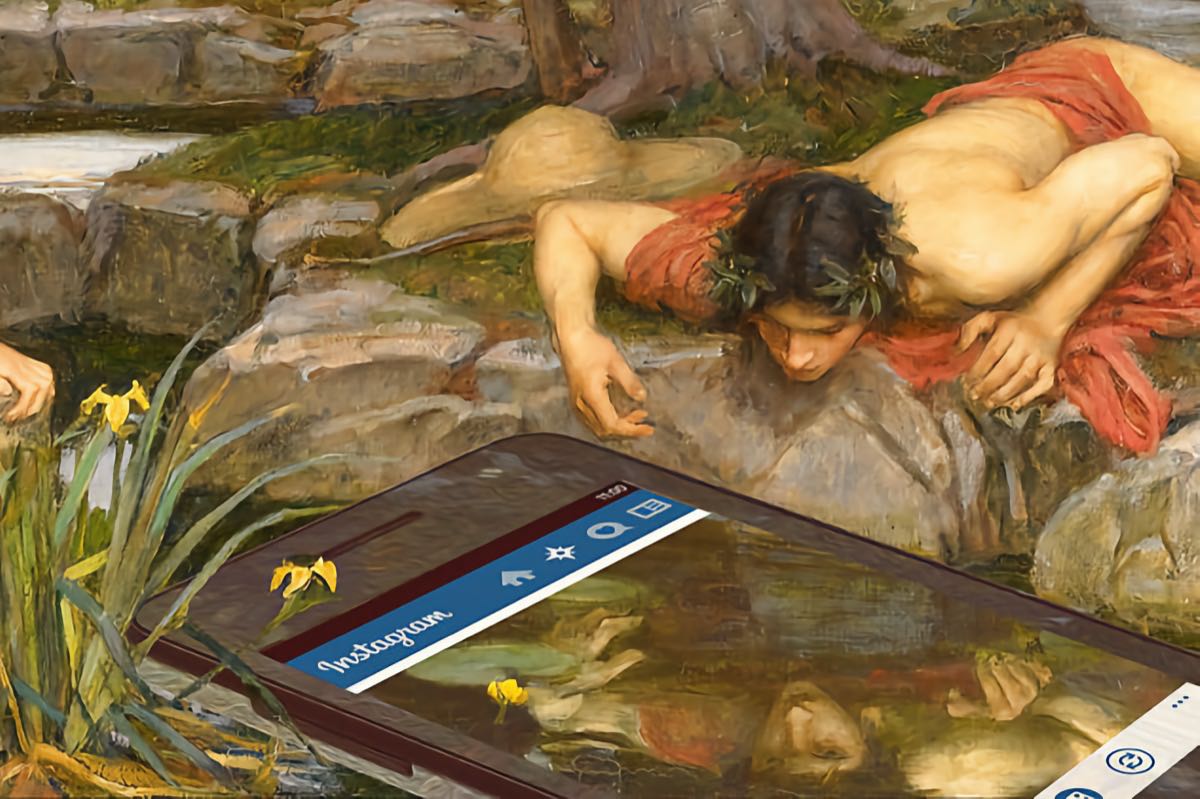artwork by Dan Cretu
The Envy of Others?
Hello dear Realists,
This post will be a little different than usual. More than an essay – as I’m used to sharing with you – it’s all about a question I am pondering. And I would love to hear your thoughts about it.
Are we naturally inclined to seek the envy of others?
Are online platforms designed to put us in competition against one another?
Which came first: the chicken or the egg?
Illusionists, Too
As many of you know, I spent almost a decade working on The Illusionists – a documentary that exposes the toxic side of mass media and advertising, how they’ve been exacerbating and exploiting insecurities about our looks for profit.
Now that I’m back at work on its sequel, I’m turning my gaze away from traditional media and towards technology platforms, social media in particular.
At the risk of sounding naive, when Instagram’s popularity was on the rise, commanding the attention of tens of millions of people around the world, I held out a bit of hope. “Power back to the people!” I thought. Gone are the days of unrealistic beauty standards and a bombardment of images of unattainable beauty. We get to determine our own standards – no more supermodels or hyper-perfected, Photoshopped images, I thought.
My oh my was I mistaken!
As I wrote in an earlier post about FaceApp, “Mass media and advertising are no longer the main illusionists in our culture. We are. We have become illusionists, by the way we present ourselves on social media.”
Ways of Seeing & The Envy of Others
I often find it useful to look at the past to understand the present. John Berger’s Ways of Seeing (1972) was instrumental in making me understand how the visual codes of paintings informed beauty ideals for centuries… up to the present day.
Berger had some astute observations about modern advertising (which he referred to as”publicity”):
Publicity is not merely an assembly of competing messages: it is a language in itself which is always being used to make the same general proposal. […] It proposes to each of us that we transform ourselves, or our lives, by buying something more. This more, it proposes, will make us in some way richer – even though we will be poorer by having spent our money. Publicity persuades us of such a transformation by showing us people who have apparently been transformed and are, as a result, enviable. The state of being envied is what constitutes glamour. And publicity is the process of manufacturing glamour.
What really stood out to me: “The state of being envied is what constitutes glamour.”
Later on, Berger said:
Publicity is always about the future buyer. It offers him an image of himself made glamorous by the product or opportunity it is trying to sell. The image then makes him envious of himself as he might be. Yet what makes this self-which-he-might-be enviable? The envy of others. Publicity is about social relations, not objects. Its promise is not of pleasure, but of happiness: happiness as judged from the outside by others. The happiness of being envied is glamour.
My jaw literally dropped at these words: “happiness as judged from the outside by others. The happiness of being envied is glamour.” Because wouldn’t you say that this sentiment rings true for a visual platform like Instagram? And wouldn’t that perfectly apply to LinkedIn, too?
Toxic Places
There have been plenty of recent studies focusing on a recent epidemic of anxiety and depression for young people around the world… starting in and around 2011, with the rising popularity of smartphones and visual platforms like Instagram. If you are curious, a phenomenal resource to learn more about this is the After Babel newsletter on Substack.
Instead of connecting us (the surface goal of these devices and platforms), wouldn’t you say that for many people, these tools help them showcase an idealized, “highlight reel” of their lives… in order to be liked (or even envied) by others?
Problem is: how can we build genuine, strong connections with other people if we are in a digital space that favors competition, one-upmanship and constant comparison?
And now you may play devil’s advocate and say: but there are social networks focused on sharing authentic, unvarnished moments… like BeReal, the app that prompts users to share photos of what they are doing – using the front facing and back camera of their smartphone – at a random 2-minute time window each day.
No time to be real?
Thing is, mundane, raw moments do not seem to hold the attention of internet users. At its peak of popularity a year ago, BeReal had 15 million daily active users, but that number has fallen more than 60%. The New York Times covered this topic in a recent feature:
The spell seems to have broken. Some users have discovered that seeing the monotony of their own lives reflected back at them is compelling for only so long.
When Night Noroña, 17, a high school student in Redding, Calif., downloaded the app in August, he liked seeing that his friends’ lives were less glamorous than the highlight reels they posted to Instagram suggested, he said. But after a few months, he tired of scrolling through nearly identical pictures of their laptop screens and deleted the app. Most of his friends no longer use it either, he said.
Would it be fair to say that people are naturally drawn to idealized images… even if they may lead to comparison anxiety and feelings of inadequacy?
What to do?
Opposites
Well, what is the opposite of envy?
Generosity.
And how about compassion? And maybe… wonder?
My dear friend Monica Parker has written a book – The Power of Wonder: The Extraordinary Emotion That Will Change the Way You Live, Learn, and Lead – that makes the case it is an emotion worth pursuing… much more than the ever so elusive happiness.
She wrote:
Our device culture, while connecting us, has simultaneously cut us off from one another, and empathy levels have dropped almost 50 percent in the past twenty years. Inundated by change, distracted by choice, polarized into ever-reductive tribes, and struggling to reach equilibrium, we are living in a world of instant gratification, life hacks, and quick fixes. In short, we have been given the keys to a brave new world and can’t yet reach the pedals. Wonder is the catalyst to build the social and emotional competencies we need to make us more open, more curious, more compassionate . . . more human.
Yes to openness, curiosity, compassion and being more human. And also yes to “Shine Theory” – a term coined by friends Ann Friedman and Aminatou Sow ten years ago, describing this ethos: “I don’t shine if you don’t shine.”
Shine theory posits that surrounding yourself with smart, inspiring people and helping them succeed can benefit you, too; it’s all about solidarity instead of competition.
So, going back to my original question:
Are we naturally inclined to seek the envy of others?
What if we tapped into compassion and solidarity instead?
Are online platforms designed to put us in competition against one another?
If that is how a social media platform or even a particular post makes you feel, maybe you could redirect that energy towards helping someone else, lifting them up, offering them a kind word of support.
Maybe we could all use these uncomfortable feelings – read: of envy, anxiety or inadequacy – as an opportunity to do good instead. That’s what a Realist would do.
Elena




